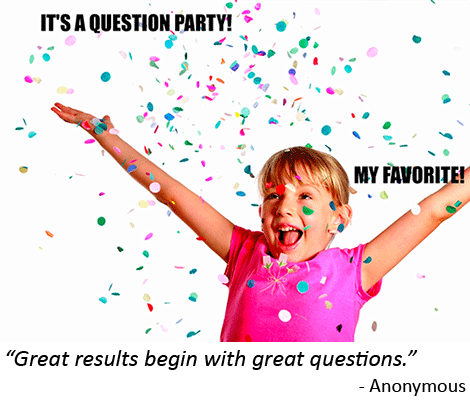Listening (“Go-To” Skill #1) and asking questions of genuine curiosity (“Go-To” Skill # 2) are the keys to the kingdom of understanding and working well with others to solve tough issues. Without these two, we are stuck in the movie Groundhog Day, recreating the same conversation over and over again until we get it right.
In “Change Your Questions Change Your Life” Marilee Adams makes a distinction between “learner questions” and “judger questions.” Questions of genuine curiosity are “learner questions.” They deepen our understanding of others and the topic at hand. They also help us create and maintain a sense of relationship with people at work or in our communities. In this way, they help us feel safe enough that we can bring our best selves to the table: body, mind, heart and spirit.
Imagine meetings that start with questions like:
- What draws you to this conversation?
- Why is this topic important to you?
- What are your highest hopes for this meeting?
- How could we interact so that we increase the likelihood of finding common ground and avoid becoming polarized?
How about questions during it like these?
- How did you come to see the situation this way?
- What is at stake for you (or your community or organization)?
- How does this issue affect you?
- What leads you to believe this is the right way forward?
- What questions do you think we should be asking ourselves?
Any hint that these are insincere or “gotcha” questions or that you are not listening to people’s responses, turns them from learner questions to judger ones.
You might be more familiar with judger questions. They shut down productive conversations and trigger people’s self-protective mechanisms. They are often the source of people getting truculent, checking out, or becoming passive. How often have you heard the following questions asked directly or implicitly?
- Who is responsible for getting us into this mess?
- Why can’t you just let it go and move on?
- What possible evidence do you have that supports your position?
- How could we have been so stupid?
- What makes you think it’s our job to fix this?
Judger questions are more available to us when we are scared or angry because their purpose is to attack or defend. Learner questions can, however, connect us with one another and with the executive functions in the prefrontal cortex. I suggest you practice asking learner questions in calm waters first. It can be difficult to access them when you are emotionally hijacked and operating under the influence of the automatic impulses of the sub-cortical parts of the brain. What learner questions would you like to ask at your next meeting?


Full of salient points. Don’t stop beenvliig or writing!